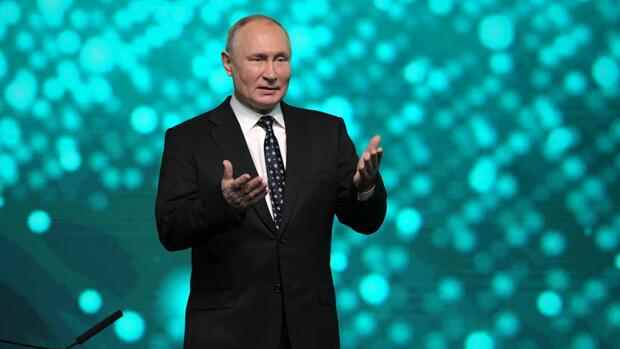Vladimir Putin stirs up uncertainty and attacks, initially rhetorically.
(Photo: imago images / SNA)
Moscow Sergej Krikaljow gives his friend Franz Viehböck a warm hug. Both were together at the Mir space station in 1991, one as the last Soviet, the other as the first Austrian cosmonaut. They came together for the 30th anniversary.
Krikalev now leads the manned space program at the state agency Roskosmos. The international cooperation that was just beginning at that time has meanwhile become a feature of space travel, the conquest of the cosmos serves only peaceful purposes, the 63-year-old emphasizes. A noble intention.
Nobody seems to have said this to the Russian Defense Ministry, however, because the military were busy rehearsing for Star Wars at the weekend and took a decommissioned Soviet spy satellite from the sky with the “Nudol” missile defense system.
Because of the debris flying around in space, the ISS crew – including the German Matthias Maurer and the two Russian cosmonauts Pyotr Dubrow and Anton Schkaplerow – had to dive into the feeder spaceships for hours.
Top jobs of the day
Find the best jobs now and
be notified by email.
However, the incident also potentially threatens other TV and communication, weather and navigation satellites, and consequently the entire modern lifestyle of society. Only two days later, those responsible commented on the incident and ironed out all the allegations. Defense Minister Sergei Shoigu spoke of “jewelry work” and praised the new weapons system as promising, while Foreign Minister Sergei Lavrov accused the Americans of “hypocrisy” and actively promoting an arms race in space.
Putin’s plan is to provoke crises and stir up uncertainty
Lavrow’s criticism of the US, which refuses to sign a treaty banning space weapons, cannot be completely dismissed. Presenting it directly after your own space shootout and at the same time denying its danger to international space travel, however, does not help the credibility of your own argumentation.
But the tactic has a system: Russia also vehemently denies its own wrongdoing in other crises and instead attacks the other side rhetorically. Like in Ukraine, where Moscow succinctly dismisses reports of a Russian troop concentration in front of the border as “alarmist”, while its General Staff complains about the large number of NATO maneuvers and surveillance flights.
The Kremlin brushes aside the fact that, in view of the Russian “vacationers” who appeared in the Crimea and Donbass in 2014, Russian troop movements have since aroused suspicion and forced an investigation. Nor is it doing little to allay Ukraine’s concerns. The unclear situation with the regular crises – most recently in the spring due to a similar parade – is intended to stir up uncertainty, provoke incorrect assessments in the counterpart and thus gain tactical advantages.
Camouflaging, deceiving and tricking: These are the principles of Putin’s policy because he has betrayed himself by the West and feels that Russia has been cheated out of the great power it is entitled to. These smoke-throwing tactics lead to suspicions: the accusation that Putin is behind the refugee crisis on the Polish-Belarusian border is probably exaggerated. But the role that Russia plays is always diffuse. Because main actor Alexander Lukashenko would hardly act as brutally as a blackmailer if he had not been prompted that Moscow was behind him.
In any case, his behavior does not contribute to more stability, the guarantor of which Putin is happy to be celebrated in Russia, neither in Europe nor in space.
More: Putin wants to mediate in the refugee crisis
